Looking for seriously fun science, technology, engineering, and maths news for your curious kids or tech-talented teens? We've got you covered! Inside every issue you'll find articles, activities, puzzles, comics, and prizes galore. Perfect reading for enquiring minds, CSIRO's Double Helix magazine is packed with news, features, fun experiments, giveaways and more. Each issue focuses on a different theme, from smells to spaceships and beyond! With clear language and eye-catching design, the content promotes critical thinking, strengthens literacy skills and is the perfect fuel to spark or sustain an interest in STEM. Double Helix is published eight times a year. It is ideal for 8 to 13-year-olds and enjoyed by older readers as well.
Double Helix
HELIX HQ
ON THE DOUBLE
GLASS FROM VOLCANOES, METEORITES AND SPINIFEX • Aboriginal and Torres Strait Islander peoples have used natural forms of glass to make cutting tools for many thousands of years. These tools were used for a variety of tasks, including preparing food, creating clothing, and for warfare and ceremonial purposes.
GLASS-TOWERED SPONGES
EXAMINING X-RAYS • X-rays have been helping doctors (and superheroes) look closer at what’s going on inside us for more than 120 years. Today, computer programmers are teaming up with medical professionals to help make X-rays safer for patients.
BY THE NUMBERS: GLASS
TAILS ON, TAILS OFF! • Many lizards can drop their tails to escape becoming dinner. But how do their tails stay on?
TIMING OF CLOWNFISH STRIPES DEPENDS ON ANEMONE • Imagine if your home affected how fast you grew up! For the orange clownfish, it does.
CAN BIRDS OUTSMART SCIENTISTS? • Studying animals is difficult. Scientists often battle unpredictable animal behaviours, natural disasters and equipment problems in their efforts to understand our fellow inhabitants.
SUBSCRIBE
Bringing back the oyster reefs
TIME-TRAVELLING SHED
IMPROVING AUSTRALIA’S GLASS RECYCLING • Do you see the glass as half full or half empty? Well, research scientists such as Dr Tim Baynes at CSIRO look at the glass and think about where it will end up when you throw it out.
TECHNOLOGY IN ACTION: OUR GLASS FUTURE
OUR INCREDIBLE RELIANCE ON SAND • SAND IS A PRETTY SPECIAL MATERIAL. GLASS, CONCRETE, ELECTRONICS AND EVEN SOME MEDICINES ALL USE SAND IN THEIR CONSTRUCTION, MAKING IT THE MOST-CONSUMED NATURAL RESOURCE – BESIDES WATER – ON THE WHOLE PLANET.
HOW CAN WE HELP SAVE SAND? • ALTHOUGH THIS PROBLEM MIGHT SEEM QUITE FAR AWAY, WE CAN START HELPING NOW.
‘Unbreakable’ smartphone screens • Have you ever been inspired by food? Dr Jingwei Hou has. Jingwei and his team at the University of Queensland (UQ) have developed the technology to produce crystal-clear, ‘unbreakable’ glass for smartphones, televisions and computer screens. And it started with a chocolate chip cookie.
GLASS MODELS OF MARINE MARVELS
POSTER
THE ENCYCLOPEDIA OF STEM WORDS
OCEANS OF PLASTIC
MARS AWAKENS
DOUBLE HELIX SPOKE WITH HM WAUGH, AUTHOR OF MARS AWAKENS
ARCHAEOLOGY IN SPACE • HELLO HUMANS! GAIL LEXY HERE, DIGGING INTO THE FIRST ARCHAEOLOGICAL STUDY IN SPACE.
VIRTUAL REALITY • Computer games can really suck you in, but virtual reality (VR) makes them feel almost real. And new tech means VR’s still getting better.
RUN OFF • SOMETIMES THE BEST WAY TO FIGURE SOMETHING OUT IS TO GRAB A SCRAP OF PAPER AND DO A QUICK CALCULATION. SCIENTISTS CALL THESE ’BACK OF THE ENVELOPE’ CALCULATIONS. GET YOUR ENVELOPE READY!
WHAT’S YOUR QUESTION? • Got a weird and wonderful question about science, technology, engineering or maths? If you don’t know who to ask, let us help you out! We’ll find answers to the best questions...

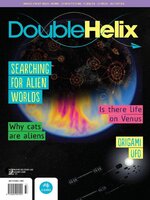 Issue 77
Issue 77
 Issue 76
Issue 76
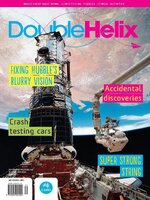 Issue 75
Issue 75
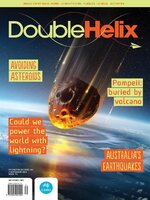 Issue 74
Issue 74
 Issue 73
Issue 73
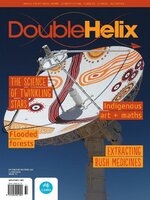 Issue 72
Issue 72
 Issue 71
Issue 71
 Issue 70
Issue 70
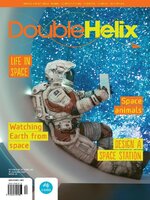 Issue 69
Issue 69
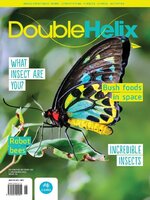 Issue 68
Issue 68
 Issue 67
Issue 67
 Issue 66
Issue 66
 Issue 65
Issue 65
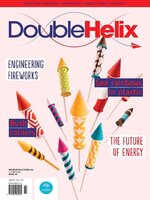 Issue 64
Issue 64
 Issue 63
Issue 63
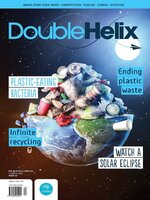 Issue 62
Issue 62
 Issue 61
Issue 61
 Issue 60
Issue 60
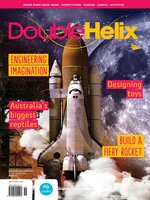 Issue 59
Issue 59
 Issue 58
Issue 58
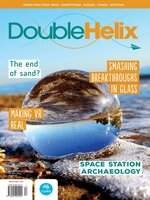 Issue 57
Issue 57
 Issue 56
Issue 56
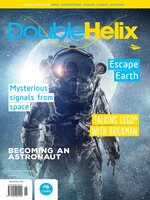 Issue 55
Issue 55
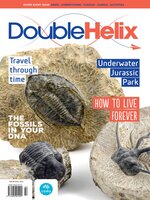 Issue 54
Issue 54
